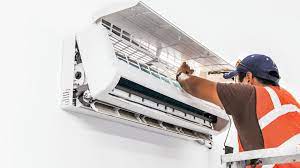
AC technician course in Peshawar
In a world where comfort and convenience are paramount, air conditioning (AC) systems play a crucial role in our daily lives. As the demand for efficient cooling solutions continues to rise, so does the need for skilled professionals to install, maintain, and repair these systems. The AC Technician Course emerges as a gateway to a rewarding and in-demand career in the HVAC (Heating, Ventilation, and Air Conditioning) industry.
Course Benefits:
High Demand for Skilled Professionals:
With the increasing reliance on air conditioning systems across various sectors, there is a constant demand for skilled AC technicians. This course equips individuals with the expertise needed to meet the growing industry demands.
Hands-On Training:
The AC Technician Course is designed to provide practical, hands-on training. Students gain valuable experience in working with different types of AC systems, troubleshooting common issues, and performing installations and repairs.
Industry-Relevant Curriculum:
The curriculum is meticulously crafted to align with industry standards. Students delve into topics such as refrigeration principles, electrical systems, system diagnostics, and environmental regulations, ensuring a comprehensive understanding of the field.
Learning Outcomes:
Technical Proficiency:
Graduates of the AC Technician Course acquire the technical skills necessary to install, maintain, and repair various types of air conditioning systems. This includes expertise in handling refrigerants, understanding electrical components, and diagnosing system malfunctions.
Problem-Solving Skills:
The course focuses on honing problem-solving skills, enabling graduates to identify and rectify issues efficiently. From diagnosing electrical faults to optimizing system performance, students develop the ability to troubleshoot a wide range of problems.
Safety and Environmental Compliance:
Students learn about safety protocols and environmental regulations associated with HVAC systems. This knowledge ensures that graduates adhere to industry standards and contribute to sustainable practices in their professional endeavors.
Study Units:
Fundamentals of HVAC Systems:
An overview of heating, ventilation, and air conditioning systems, providing a foundation for understanding the interplay between these components.
Refrigeration Principles:
In-depth exploration of refrigeration cycles, thermodynamics, and the principles behind the cooling process.
Electrical Systems and Controls:
Understanding electrical components, circuits, and control systems essential for proper functioning and maintenance of AC systems.
Installation and Maintenance:
Practical skills for installing and maintaining various types of air conditioning units, including split systems, central air systems, and ductless systems.
Who Is This Course For?
The AC Technician Course is suitable for:
Individuals aspiring to enter the HVAC industry.
Professionals in related fields seeking to expand their skill set.
Students looking for a hands-on and in-demand career path.
Future Progression:
Upon completing the AC Technician Course, graduates have a myriad of opportunities for career advancement, including:
Specialization: Further specialize in areas such as commercial HVAC, industrial refrigeration, or energy-efficient systems.
Entrepreneurship: Start a business offering AC installation, maintenance, and repair services.
Advanced Certifications: Pursue advanced certifications in specialized areas to enhance career prospects.
Continuous Learning: Stay updated with emerging technologies through ongoing professional development and training.
In conclusion, the AC Technician Course opens doors to a dynamic and fulfilling career in the HVAC industry. As the demand for efficient cooling solutions continues to grow, trained professionals in this field are poised for success, making this course a valuable investment in a cool and promising future.